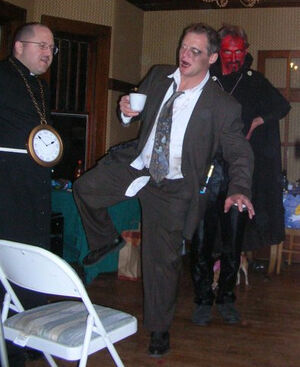Joke (nonfiction)
A joke is a display of humor in which words are used within a specific and well-defined narrative structure to make people laugh and is not meant to be taken seriously. It takes the form of a story, usually with dialogue, and ends in a punch line. It is in the punch line that the audience becomes aware that the story contains a second, conflicting meaning. This can be done using a pun or other word play such as irony, a logical incompatibility, nonsense, or other means.
Discussion
Karl Jones
Jokes go wrong so easily with ugly and unforeseeable consequences.
- Post @ Twitter (13 May 2021)
Robert Hetzron
Linguist Robert Hetzron offers the definition:
A joke is a short humorous piece of oral literature in which the funniness culminates in the final sentence, called the punchline… In fact, the main condition is that the tension should reach its highest level at the very end. No continuation relieving the tension should be added. As for its being "oral," it is true that jokes may appear printed, but when further transferred, there is no obligation to reproduce the text verbatim, as in the case of poetry.
It is generally held that jokes benefit from brevity, containing no more detail than is needed to set the scene for the punchline at the end. In the case of riddle jokes or one-liners the setting is implicitly understood, leaving only the dialogue and punchline to be verbalized. However, subverting these and other common guidelines can also be a source of humor—the shaggy dog story is in a class of its own as an anti-joke; although presenting as a joke, it contains a long drawn-out narrative of time, place and character, rambles through many pointless inclusions and finally fails to deliver a punchline. Jokes are a form of humor, but not all humor is a joke. Some humorous forms which are not verbal jokes are: involuntary humor, situational humor, practical jokes, slapstick and anecdotes.
Identified as one of the simple forms of oral literature by the Dutch linguist André Jolles, jokes are passed along anonymously. They are told in both private and public settings; a single person tells a joke to his friend in the natural flow of conversation, or a set of jokes is told to a group as part of scripted entertainment. Jokes are also passed along in written form or, more recently, through the internet.
Stand-up comics, comedians and slapstick work with comic timing, precision and rhythm in their performance, relying as much on actions as on the verbal punchline to evoke laughter. This distinction has been formulated in the popular saying "A comic says funny things; a comedian says things funny".
Koestler on Old Testament laughter
In The Act of Creation (1964), Arthur Koestler observes:
In the Old Testament there are (according to Mitchell) twenty-nine references to laughter, out of which thirteen are linked with scorn, derision, mocking, or contempt, and only two are 'born out of a joyful and merry heart'."
In the News
"The Jokes of My Fears" is a song by [REDACTED].
Fiction cross-reference
- Gnomon algorithm
- Gnomon Chronicles
- Jokes go wrong - Jokes go wrong so easily with ugly and unforeseeable consequences.
- The Jokes of My Fears
Nonfiction cross-reference
External links
- Joke @ Wikipedia
- Ironic Nazis Are Still Nazis @ New Republic
- Brexiteer businessman hopes Greta Thunberg suffers "freak yachting accident"
- Stochastic Terrorism:
- A leader or organization uses rhetoric in the mass media against a group of people.
- This rhetoric, while hostile or hateful, doesn’t explicitly tell someone to carry out an act of violence against that group, but a person, feeling threatened, is motivated to do so as a result.
- That individual act of political violence can’t be predicted as such, but that violence will happen is much more probable thanks to the rhetoric.
- This rhetoric is thus called stochastic terrorism because of the way it incites random violence.
